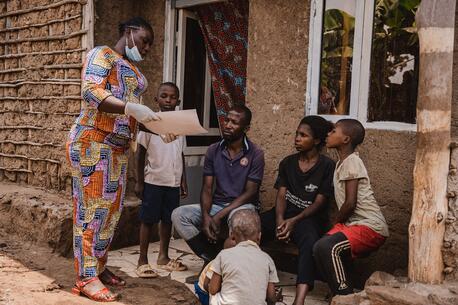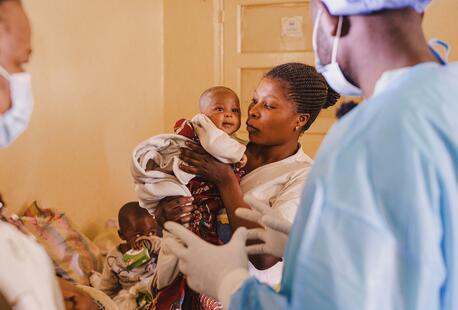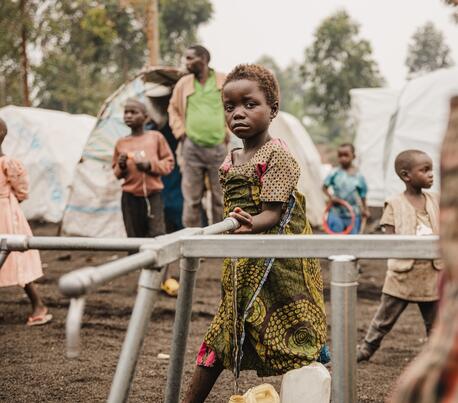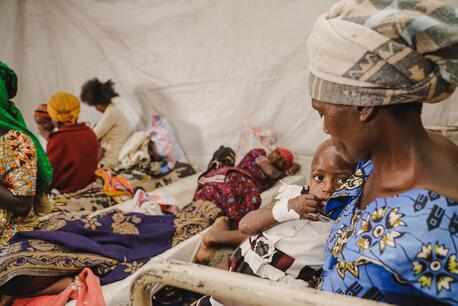
Amid Mpox Surge, UNICEF Readies Response
A different, deadlier form of the virus formerly known as monkeypox is killing children in countries across Africa. In the Democratic Republic of the Congo, the epicenter of the crisis, the outbreak is disproportionately impacting children — more than half of reported cases are children under age 15. The World Health Organization has declared a public health emergency of international concern. What UNICEF is doing to support containment and prevention efforts.
Public health emergency declared, children at highest risk of death
UNICEF is supporting the World Health Organization and other partners to help contain an outbreak of a form of mpox that is particularly dangerous for children.
So far, the majority of cases in children are being reported in the Democratic Republic of the Congo, with some cases being reported in neighboring countries Burundi, Kenya, Rwanda and Uganda.
Cases are also rising in Central African Republic (CAR), Cameroon, Chad, Nigeria, Cote d'Ivoire and Liberia. UNICEF staff across the West and Central Africa and Eastern and Southern Africa regions are on alert.
The WHO declared the outbreak a public health emergency of international concern on Aug. 14. The Africa Centers for Disease Control and Prevention declared it a public health emergency of continental security on Aug. 13.
Previous outbreaks categorized as public health emergencies of international concern: Ebola and COVID-19.
The DRC is the epicenter of the crisis, with children under age 15 representing 56 percent of mpox cases reported in the country. So far this year, 8,772 children have been infected and 463 have died.
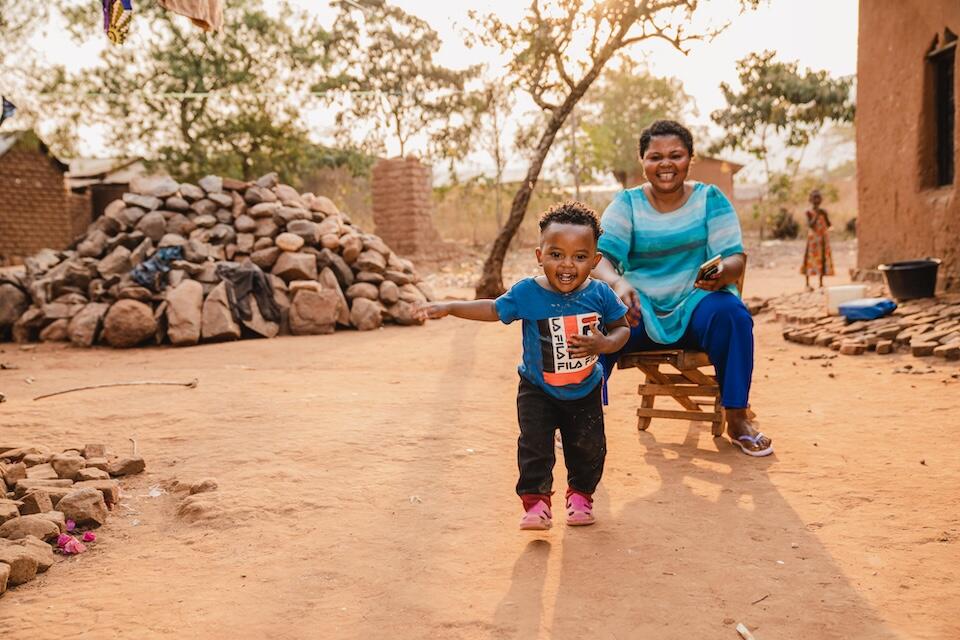
The outbreak adds one more burden on children and families already living through ongoing conflict and displacement, cholera and polio outbreaks and malnutrition, UNICEF Regional Director for West and Central Africa Gilles Fagninou said.
“The evidence indicates that children, especially those malnourished or affected by other illnesses, are the most vulnerable to catching and dying from this strain of mpox," Fagninou said. "Protecting them must be the top priority.”
Children, especially those malnourished or affected by other illnesses, are the most vulnerable to catching and dying from this strain of mpox. Protecting them must be the top priority. — Gilles Fagninou, UNICEF Regional Director for West and Central Africa
Mpox, previously called monkeypox, is a viral zoonotic disease — caused by a virus transmitted to humans from animals. It occurs primarily in tropical rainforest areas of Central and West Africa and is occasionally exported to other regions. In 2022, a multi-country outbreak affected nearly 100,000 people.
Symptoms are similar to those that were seen in smallpox patients, though less severe. Even though some people may be more at risk than others, it is important to remember that anyone, anywhere, can get it.
And children suffer the highest mortality rate.
In making the declaration, WHO Director-General Tedros Adhanom Ghebreyesus said: "The emergence of a new clade of mpox, its rapid spread in eastern DRC, and the reporting of cases in several neighboring countries, are very worrying. On top of outbreaks of other mpox clades in DRC and other countries in Africa, it’s clear that a coordinated international response is needed to stop these outbreaks and save lives.”
A coordinated international response is needed to stop these outbreaks and save lives. — World Health Organization Director-General Tedros Adhanom Ghebreyesus
Medical experts are urging action to accelerate access to testing, vaccines and therapeutic drugs in affected areas. Public information campaigns are also needed to reduce stigma associated with the virus. All of these activities are part of UNICEF's mandate focused on children's health.
Children appear to be particularly susceptible to the new variant of the mpox virus that is driving this latest outbreak. The mpox outbreak in 2022 was largely among adults; the current outbreak is markedly different in that it is affecting large numbers of children.
Children who are malnourished or otherwise suffering from poor health, their immune systems compromised, are at greater risk of dying of diseases, including mpox.
Mpox is related to smallpox. Immunization against smallpox was discontinued after smallpox was eradicated in 1980. There are safe and effective vaccines that protect against mpox, but they have not been routinely given to children. UNICEF is currently collaborating with vaccine partners on an emergency vaccination strategy in response.
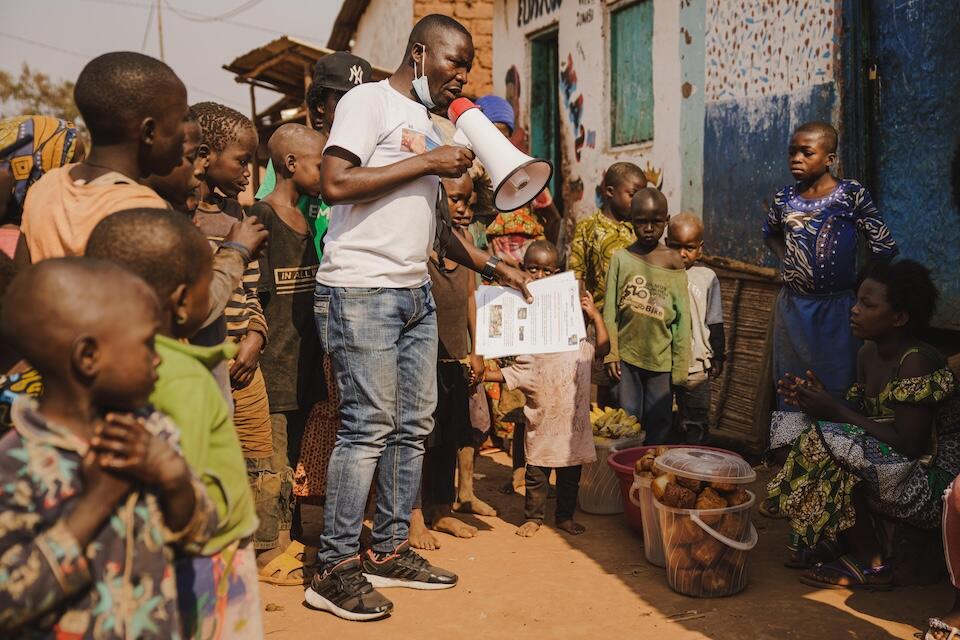
How UNICEF is responding to the mpox emergency
UNICEF is working in partnership with the WHO, Africa CDC and civil society organizations to prepare and implement a comprehensive response to the upsurge in mpox cases.
UNICEF DRC has been implementing preventative measures since early this year and is now working with government partners on a cross-sectoral response that includes:
- risk communication and community engagement: establishing ways for communities to share information on infections and protection and safety measures, training community leaders and workers
- infection prevention and control: enhancing capacities of hygienists, supporting household decontamination, providing hygiene supplies to health care facilities
- medical and nutritional care: distributing emergency health kits to facilities handling mpox patients, installing tents to create additional treatment space, providing support to patients' families
- mental health and psychosocial support: addressing stigma and discrimination
- integrated outbreak analysis: improving data quality and availability, strengthening health systems
- coordination: supporting information sharing with partners and evidence-based strategic plans
UNICEF is also collaborating on a three-phase vaccine response strategy with Gavi, the Vaccine Alliance and other partners.
“The current upsurge of mpox in parts of Africa ... is an emergency, not only for Africa, but for the entire globe," Dimie Ogoina, Chair of the emergency committee of independent experts behind the WHO's Aug. 14 declaration. "Mpox, originating in Africa, was neglected there, and later caused a global outbreak in 2022. It is time to act decisively to prevent history from repeating itself."
UNICEF in West and Central Africa urgently needs flexible emergency funding to address growing needs in the DRC, scale up preventative measures in other countries throughout the region and mitigate a catastrophic impact elsewhere.
Your tax-deductible contribution can make a difference. Donate today.
Learn more about what UNICEF is doing for children in the Democratic Republic of the Congo.
HOW TO HELP
There are many ways to make a difference
War, famine, poverty, natural disasters — threats to the world's children keep coming. But UNICEF won't stop working to keep children healthy and safe.
UNICEF works in over 190 countries and territories — more places than any other children's organization. UNICEF has the world's largest humanitarian warehouse and, when disaster strikes, can get supplies almost anywhere within 72 hours. Constantly innovating, always advocating for a better world for children, UNICEF works to ensure that every child can grow up healthy, educated, protected and respected.
Would you like to help give all children the opportunity to reach their full potential? There are many ways to get involved.



